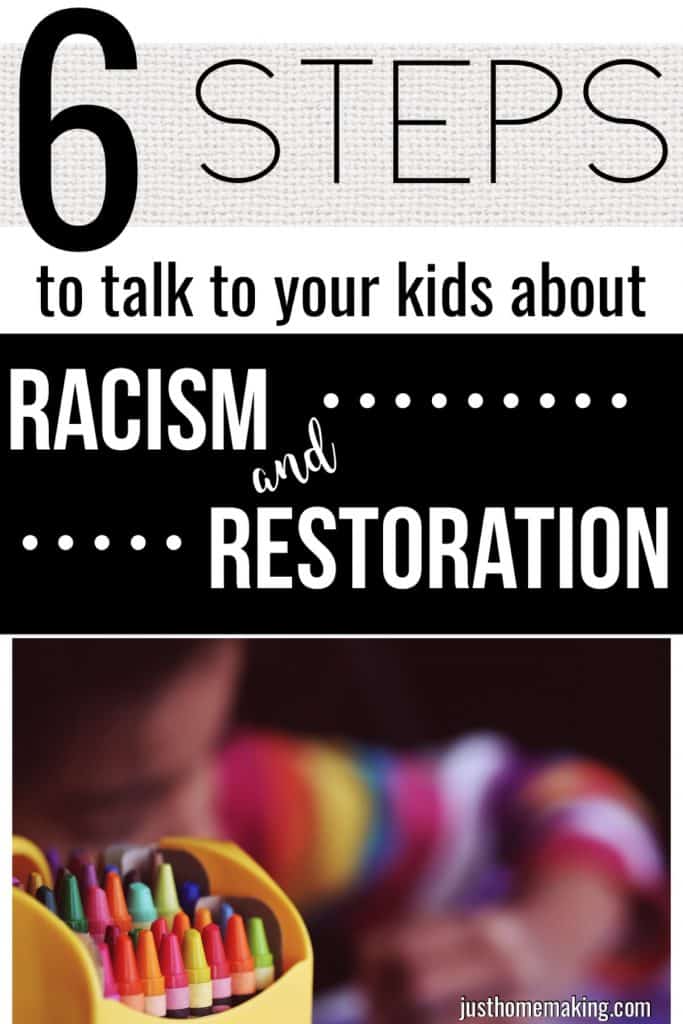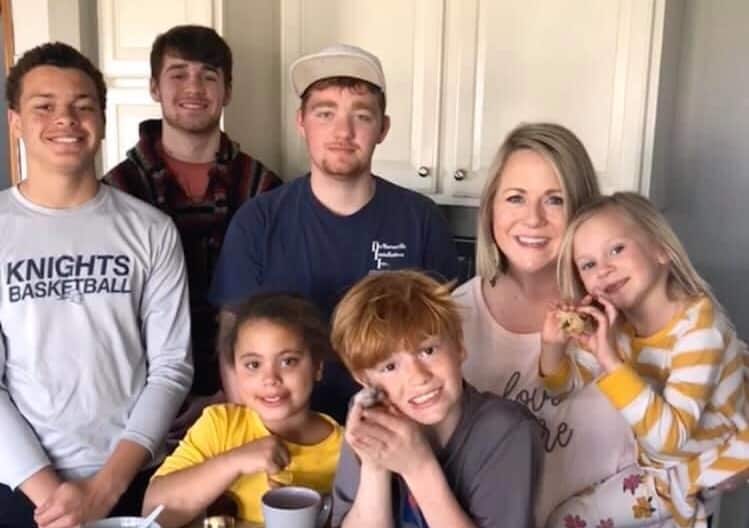How to Talk to Kids about Racism
In a season of turmoil, it is very tempting to shut out the problems of the world and hide away from it all. However, as Christian parents, our job is to point our kids to Jesus no matter what. They will grow up and leave the nest eventually and what we teach them at home is what they take with them.
One of the biggest life lessons I desire to teach my children is who their neighbor is, and how to love our neighbors with Jesus’s love.
Racial Injustice
Racial injustices are happening all around us. Some people choose to have an indifferent attitude about it, but that doesn’t mean we can turn a blind eye to what is happening in our own country and even right in our own neighborhoods.
We have an opportunity to live out one of Jesus’ parables right here and right now. We can take our kids along for the ride of learning to love our neighbors and establishing just who Jesus says our neighbors truly are.
>>>Please join me as we learn how to talk to kids about racism, racial discrimination, and reconciliation.

Where To Begin
It’s no secret that there are people who are discriminated against because of their skin color. Racial discrimination wasn’t created in the United States, and it has been happening almost as long as humans have been alive. However, explaining that to our kids can be tricky when it seems like kids, for the most part, don’t treat others differently based on their skin color.
That is actually a great starting point!
We can speak truth to our kids about hurt and pain and racial discrimination early so that when they spot it, they can put a stop to it before it becomes a thoughtless pattern.
So where’s the best place to start? The only authority to turn to is the Word of God.
It is important to make sure our kids know that God created each of us to be a uniquely different part of the body of Christ. We all have a role and an important part to play. The most important part is from Jesus’ words in the parable commonly known as, “The Good Samaritan,” reminding us that we are to love God first, and then love others.
The Jewish people hated the Samaritans, and thought Samaritans were beneath them. Jesus used this divide to let the Jewish people know that God uses everyone and calls us to bridge any divide.
Lessons about Racism from The Bible
Read for yourself from Luke 10:25-37(NIV):
On one occasion an expert in the law stood up to test Jesus. “Teacher,” he asked, “what must I do to inherit eternal life?”
“What is written in the Law?”, He replied. “How do you read it?”
He answered, “‘Love the Lord your God with all your heart and with all your soul and with all your strength and with all your mind’; and, ‘Love your neighbor as yourself.’”
“You have answered correctly,” Jesus replied. “Do this and you will live.”
But he wanted to justify himself, so he asked Jesus, “And who is my neighbor?”
In reply Jesus said: “A man was going down from Jerusalem to Jericho, when he was attacked by robbers. They stripped him of his clothes, beat him and went away, leaving him half dead. A priest happened to be going down the same road, and when he saw the man, he passed by on the other side. So too, a Levite, when he came to the place and saw him, passed by on the other side. But a Samaritan, as he traveled, came where the man was; and when he saw him, he took pity on him. He went to him and bandaged his wounds, pouring on oil and wine. Then he put the man on his own donkey, brought him to an inn and took care of him. The next day he took out two denarii and gave them to the innkeeper.
‘Look after him,’ he said, ‘and when I return, I will reimburse you for any extra expense you may have.’
“Which of these three do you think was a neighbor to the man who fell into the hands of robbers?”
The expert in the law replied, “The one who had mercy on him.”
Jesus told him, “Go and do likewise.”
How to have a Conversation Guided by our Faith
When we want to talk to our kids about racial reconciliation, we start with direction from the Word. Then, we must allow the truth of Jesus to guide us forward by:
- Asking Jesus to be in every conversation. Let the Holy Spirit guide the journey to be a part of change right where we live.
- Preparing our hearts and minds. Asking God to reveal to us where we have racial misconceptions.
- Checking our own biases.
- Repenting if we have been part of the problem of continuing the cycle of silent racism.
- Educating ourselves by listening to people of color who are walking this road with us.
Remember, we have power through Christ to stop the division and injustices that invade our times.
Don’t stress about doing it wrong. Remember that God’s love covers us, and the point is to bring our kids closer to the heart of Jesus. We can’t fail if we are teaching our kids to love God and love others the way He loves us.
How to talk to Kids About Racism: 6 Steps
In our live interview on our Just Homemaking Facebook page, we got to talk to my amazing friend, Toya. Toya shared a 6 part plan for how to talk to kids about racism, racial discrimination, and restoration:
- Create a safe place for your kids to be able to ask their questions.
- Find out what they know about race and racial tensions in our culture.
- Give (age appropriate) facts.
- Pray—Invite God into the conversations.
- Ask your family, “What can we do to be a part of the change?”.
- Take action! Come up with a solution and do it.
1. Create a safe place for your kids to be able to ask their questions.
Toya shared a story about how a little girl pointed out that she is black. Toya responded with a beautiful reminder that each one of us has the skin color that God gave us because that is the image of Him that he wanted to display.
God created each of us in His image and it’s so important to remind our kids to live out the image of God. The color of someone’s skin only helps us see another beautiful side of God.
The little girl in Toya’s story was taught something with love and kindness. She was in a safe place to make observations and ask questions. Do this for your kids so they can learn and grow.
2. Find out what your kids know about race and racial tensions in our culture.
Ask questions about what your kids have heard at school, on the news, or within their own family about race and people of other colors. Take the time to correct the misconceptions and false lines of thinking. Then make sure to celebrate the thoughts that are good and true.
3. Give (age appropriate) facts.
Raising kids to be aware of the world around them is so important. It is important to gently remove the band aide of “protection” that keeps them from being aware of the world around them.
Obviously, be age appropriate, but remember that we can share the truth and keep our kids from growing up to be unaware of the hardships of their brothers and sisters in Christ.
Remind them of who Jesus says is our “neighbor.” We can keep our kids safe and protected without ignoring what is going on around them. Talk about what is right and wrong and how to spot that for our neighbors.
4. Ask your family, “What can we do to be a part of the change?”
Given the chance, kids are so creative. They might need a few prompts, but given the opportunity, I know that they will come up with great ideas to be part of the change.
Some ideas to get you started:
- Call out racist thoughts and speak truth over those thoughts
- Get to know some new friends that don’t have the same skin color as you do
- Watch shows that celebrate ethnic diversity
- Find places to volunteer
- Learn the history of why our neighbors are facing the injustices that they are, and then commit to take action
5. Take action! Come up with a solution and do it.
Remember you aren’t being asked to solve the problems of the world, and you aren’t trying to be a Savior to anyone. This is a time to come up with a solution to get rid of racial discrimination and bring about reconciliation through your family.
Take baby steps.
Talk about what this looks like for your family. Reach out to your local library, community center, Big Brothers/Big Sisters, YWCA, etc. They will have resources, classes, and volunteer opportunities to promote change, and help with a plan.
Remember, this is just the beginning. Commit to growing, learning, and loving as a family and then don’t stop.
Sympathy vs. Empathy
Another thing Toya reminded me in our Facebook live was the importance of teaching our kids the difference between sympathy and empathy. This is important to know how to talk to kids about racism.
Sympathy says, “I feel sorry for you, but I can do it from a distance.”
Empathy puts itself in its sisters’ and brothers’ shoes, trying to feel what someone else feels, and then walking with them.
Let’s teach our kids to walk in empathy. We need to walk with our friends in the battle, not just stand there watching and saying, “Sorry that you are going through that.”
Now That You Know How to talk to Kids About Racism, Will You?
Let’s remind our kids that whenever there is division and a lack of unity, it comes straight from the evil one. John 10:10 reminds us that the thief comes to kill, steal, and destroy. The root of any discord is the devil. When we focus on the word of God, and follow Jesus’s ways, then we can walk toward reconciliation.
We cannot let the enemy have this. If we aren’t calling out truth and walking in unity, then we are missing out on the fullness of God. We don’t want our kids to miss out on any part of Jesus, and that is why it is so important that we walk through any place of disunity and stand for what is right.
Don’t miss the honest Facebook Live conversation between Nicole and Toya on how to talk to kids about racism:

Believe that God is big enough!
He loves each one of us more than we can imagine, and created us for unity with one another. It’s time for us moms to rise up and create change by teaching our kids a bigger picture of how God loves each one of us. If we are not honoring the whole body of Christ, then we’re not honoring Christ!
There is so much more to be discussed on this topic, but can we commit to start the conversation? Can we commit to helping our kids live in unity with ALL of their neighbors?
Mamas, let’s be the change and teach our kids the importance of loving everyone well.
Keep learning, keep listening, and keep pointing your kids to Jesus.
If you loved learning from this article, you would also love:
4 Tips to Support a Teenager Struggling with Faith
6 Tips for Moms on Protecting Kids from Pornography

